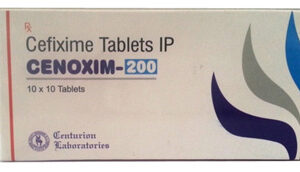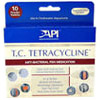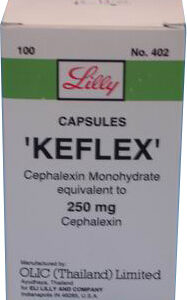Erythromycin: Drug Overview
Erythromycin is a macrolide antibiotic used for treating various bacterial infections including respiratory tract infections, skin infections, chlamydia, and syphilis. Its mechanism of action involves inhibition of bacterial protein synthesis by binding to the 50S subunit of the bacterial ribosome. Erythromycin is produced by the actinobacterium Saccharopolyspora erythraea.
Pharmacokinetics and Metabolism
After oral administration, erythromycin is absorbed from the gastrointestinal tract, with its bioavailability influenced by the presence of food. It achieves peak plasma concentrations within 1-4 hours. Erythromycin is widely distributed throughout the body, crossing the placenta and reaching fetal serum and amniotic fluid. It is metabolized primarily in the liver by demethylation and excreted in the bile; a small proportion is excreted in urine. Erythromycin’s half-life ranges from 1.4 to 2 hours in adults with normal hepatic function.
Available Dosage Forms
Erythromycin is available in several dosage forms including tablets, capsules, suspensions, topical gels or creams, and eye ointments. The base, stearate, ethylsuccinate, and estolate salts of erythromycin are designed for oral administration, whereas the lactobionate salt is intended for intravenous use. Doses vary according to the form and severity of infection.
Dosage and Administration
Adults typically receive 250 mg every 6 hours, which can be increased to 500 mg every 6 hours for more severe infections. For children, the dosage is usually 30-50 mg/kg/day divided into 2-4 doses. In treating more severe infections or for those caused by less susceptible organisms, the dosage may be doubled. Erythromycin should be taken on an empty stomach (at least 30 minutes before or 2 hours after meals) unless gastric upset occurs, then it may be taken with food or milk.
Indications for Use
Erythromycin is indicated for the treatment of infections caused by susceptible strains of bacteria, such as respiratory tract infections (e.g., pharyngitis, sinusitis), skin and soft tissue infections, listeria infections, diphtheria, pertussis (whooping cough), and pelvic inflammatory disease. Additionally, it’s used for prophylaxis of rheumatic fever and bacterial endocarditis in penicillin-allergic patients.
Drug Interactions
Erythromycin may interact with a variety of medications including warfarin, theophylline, carbamazepine, and it can raise serum levels of certain other drugs such as triazolam and ergot alkaloids due to inhibition of their metabolism. Erythromycin is a known inhibitor of CYP3A4, an important enzyme in drug metabolism. Concomitant use with other drugs metabolized by CYP3A4 may result in significant drug interactions leading to potentially toxic effects.
Side Effects and Adverse Reactions
Common side effects of erythromycin include gastrointestinal disturbances such as nausea, vomiting, abdominal cramps, and diarrhea. Less frequently, allergic reactions like rash or anaphylaxis can occur. Ototoxicity is rare, but risks increase with higher doses or in patients with renal or hepatic impairment. Prolonged or repeated use of erythromycin may result in an overgrowth of non-susceptible bacteria or fungi. Symptoms of hepatotoxicity such as jaundice, fatigue, and abdominal pain may rarely occur.
Pediatric and Geriatric Use
In pediatric patients, dosages must be carefully adjusted based on body weight and severity of infection. The estolate form of erythromycin is not recommended in infants and young children due to the potential for hepatotoxicity. In geriatric patients, there may be an increased risk of drug accumulation due to decreased hepatic or renal function; careful monitoring and dose adjustments may be necessary.
Pregnancy and Lactation Considerations
Erythromycin is categorized as a pregnancy category B drug. While there are no adequate and well-controlled studies in pregnant women, it should be used during pregnancy only if clearly needed. Erythromycin is excreted into breast milk, but is generally considered safe for use by nursing mothers. However, the infant should be observed for potential effects such as diarrhea, which may require discontinuation of the drug or breastfeeding.
Overdose Management
Overdose of erythromycin can result in severe gastrointestinal symptoms, hearing loss, and liver dysfunction. Treatment is supportive and symptomatic, with attention to fluid and electrolyte balance. Gastric lavage and administration of activated charcoal may be considered if an overdose is suspected. There is no specific antidote for erythromycin overdose.
Storage and Handling
Store erythromycin at controlled room temperature, away from light and moisture. Oral suspension should be stored in the refrigerator after reconstitution, shaken well before each use, and typically discarded after two weeks if not used. Keep all forms of erythromycin out of the reach of children.
Monitoring Parameters
Patients being treated with erythromycin should have liver function tests monitored periodically due to the possibility of hepatotoxicity. Renal function may also necessitate monitoring, especially in patients with renal impairment or those receiving high doses. Levels of drugs with a narrow therapeutic range that are metabolised by CYP3A4 should be monitored to avoid toxicity when used concomitantly with erythromycin.
Patient Counseling Information
Instruct patients to take erythromycin exactly as prescribed, at regular intervals to maintain therapeutic levels. Advise patients to report any signs of hepatic dysfunction such as jaundice, fatigue, or severe gastrointestinal symptoms. Caution patients against the use of alcohol or other hepatotoxic drugs. Inform of potential side effects, including the importance of contacting a healthcare provider if severe diarrhea develops.







Reviews
There are no reviews yet.